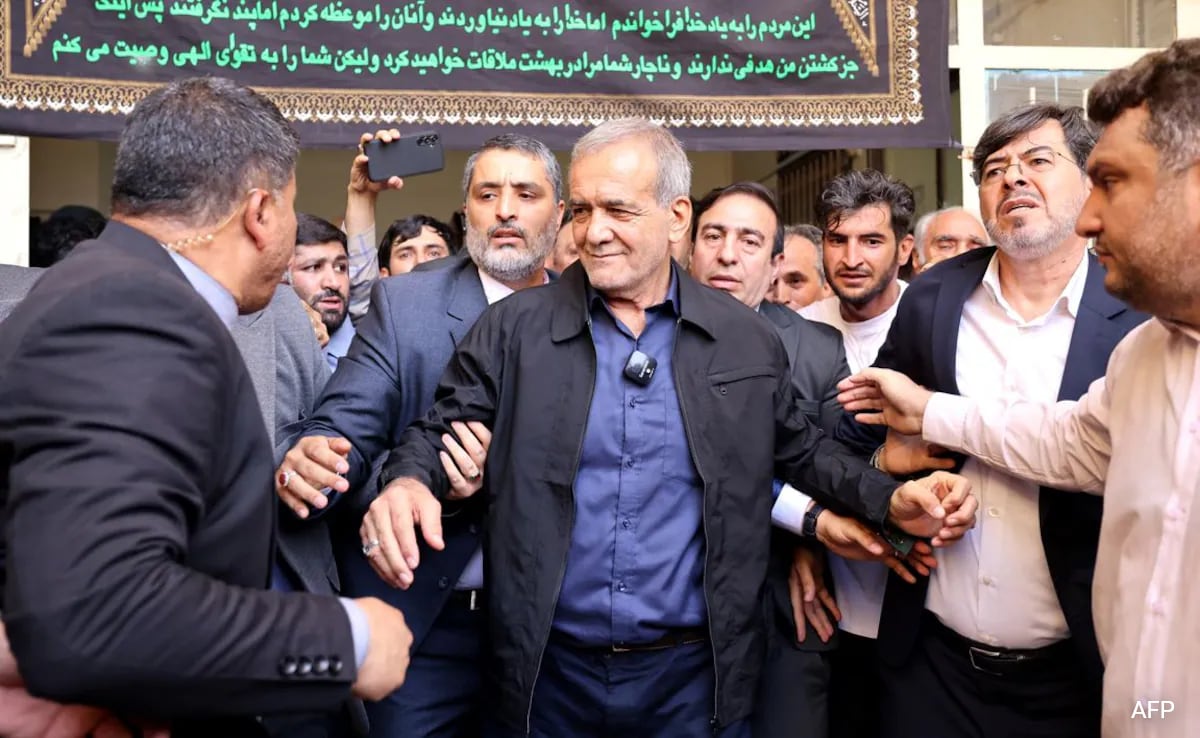2024-07-06 04:48:47

India and Iran have historically enjoyed strong economic ties.
New Delhi:
As Masoud Pezeshkian emerges victorious from Iran’s presidential election, defeating hardliner Saeed Jalili, his presidency promises a shift towards more pragmatic and reformist policies. But how will Mr Pezeshkian’s presidency reshape Iran-India relations?
Mr Pezeshkian, a seasoned lawmaker and cardiac surgeon, has long supported both domestic and international reforms in Iran. His win is viewed as a call for change since it follows a general unhappiness with the hardline policies of his predecessors. But the dynamics of Iranian politics, where hardliners still control the majority and the Supreme Leader Ayatollah Ali Khamenei retains ultimate authority, will put Mr Pezeshkian’s ability to carry out his vision to the test.
READ | Iran Reformist Pezeshkian Defeats Hardliner Jalili In Presidential Polls
“Today, we are holding the second round of the presidential election. More than 700 polling centres are accepting the vote of Iranians. We hope that by tomorrow morning we will have a new president. There will be no changes in Iranian foreign policy and internal policy. Both discourses emphasise strengthening Iranian power internally and externally,” said Iran’s ambassador to India, Iraj Elahi.
India-Iran Ties
India and Iran have historically enjoyed strong economic ties. Under Pezeshkian’s presidency, these ties are likely to deepen.
The focus will be especially on the strategic Chabahar Port, a project to which India has already committed heavy investments. It is an important transit point for trade with Afghanistan and Central Asia, bypassing Pakistan. India has pledged $120 million for the development of the Shahid-Beheshti Port terminal and offered a $250 million credit line for infrastructure projects in Iran. Experts believe that Iran’s general foreign policy is unlikely to change whoever takes over next; modus operandi and details may, however, be different.
READ | Developing Chabahar Port “De-Risks” Commerce Between India, Eurasia: PM Modi
Iran is one of India’s key sources of crude oil. With Iran eyeing an increase in the exports of oil against the backdrop of ongoing Western sanctions, India could be looking at a reliable and arguably cheaper source of crude oil.

The Pezeshkian approach to regional security will be closely watched in New Delhi. His stand related to keeping up the Axis of Resistance” against Israel and strategic regional siding with forces against what he calls “the Zionist regime” could continue to impact India’s tightrope diplomacy in the region.
Another platform for close cooperation between India and Iran is the International North-South Transport Corridor (INSTC), a multi-modal transportation route connecting India to Russia via Iran. This corridor increases connectivity in terms of trade and bilateral ties for regional stability.
Iran Elections
The presidential election in Iran takes place in the backdrop of former President Ebrahim Raisi passing away in a helicopter crash on May 19. The polls saw the lowest turnout of voters since the 1979 Islamic Revolution as only 39.92 per cent of eligible voters took part.
The Iranian government had predicted, and Supreme Leader Ayatollah Ali Khamenei forecasted a higher turnout. State television showed modest lines at polling centres, while online videos depicted empty polls and light traffic at some sites in the capital, Tehran, reportedly with a heavy security presence.
The elections were held amid heightened regional tensions. In April, for instance, Iran launched its first direct attack on Israel amid the latter’s ongoing aggression in Gaza. This was then followed by an intensification of attacks by militant groups, including Lebanon’s Hezbollah and the Houthis of Yemen, both armed by Tehran.
While Ayatollah Khamenei has the last word on state affairs, it remains to be seen if the Middle Eastern nation adopts a change in its foreign policy in light of recent events.
masoud pezeshkian,India Iran ties,Iran elections,Ayatollah Khamenei
Source link
8 total views , 1 views today
